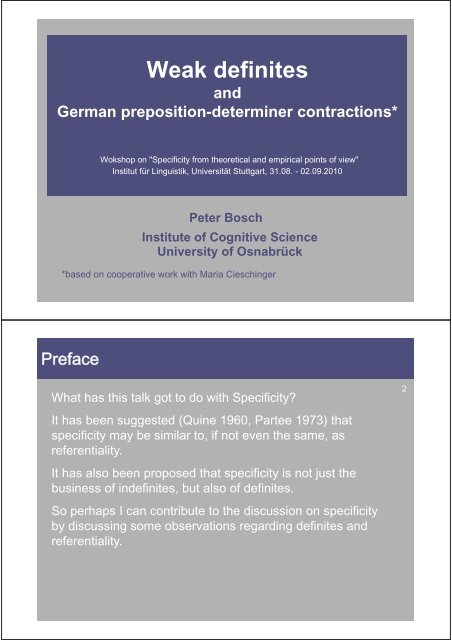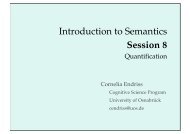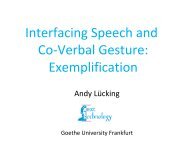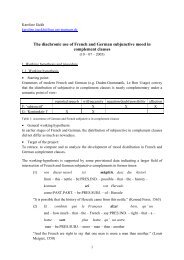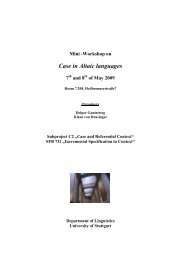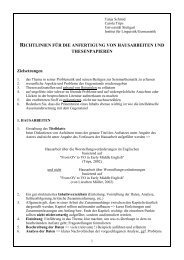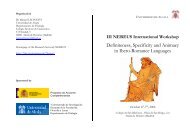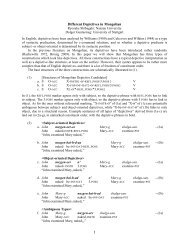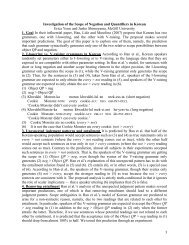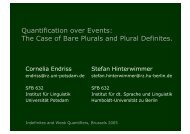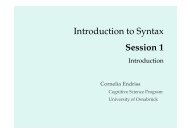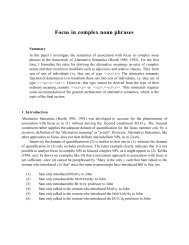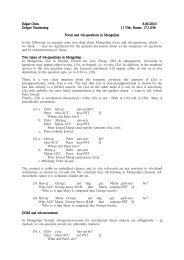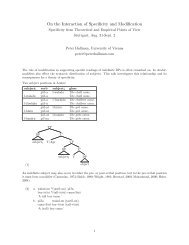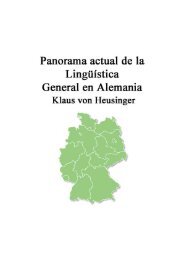Weak definites - Institut für Linguistik/Germanistik - Universität Stuttgart
Weak definites - Institut für Linguistik/Germanistik - Universität Stuttgart
Weak definites - Institut für Linguistik/Germanistik - Universität Stuttgart
You also want an ePaper? Increase the reach of your titles
YUMPU automatically turns print PDFs into web optimized ePapers that Google loves.
<strong>Weak</strong> <strong>definites</strong><br />
and<br />
German preposition-determiner contractions*<br />
Wokshop on "Specificity from theoretical and empirical points of view"<br />
<strong>Institut</strong> <strong>für</strong> <strong>Linguistik</strong>, <strong>Universität</strong> <strong>Stuttgart</strong>, 31.08. - 02.09.2010<br />
Peter Bosch<br />
<strong>Institut</strong>e of Cognitive Science<br />
University of Osnabrück<br />
*based on cooperative work with Maria Cieschinger<br />
Preface<br />
2<br />
What has this talk got to do with Specificity?<br />
2<br />
It has been suggested (Quine 1960, Partee 1973) that<br />
specificity may be similar to, if not even the same, as<br />
referentiality.<br />
It has also been proposed that specificity is not just the<br />
business of in<strong>definites</strong>, but also of <strong>definites</strong>.<br />
So perhaps I can contribute to the discussion on specificity<br />
by discussing some observations regarding <strong>definites</strong> and<br />
referentiality.
Carlson's <strong>Weak</strong> Definites<br />
3<br />
There is something of an ambiguity in the (a) sentences<br />
that is missing in the (b) sentences<br />
(1) a. Mary went to the store.<br />
b. Mary went to the desk.<br />
(2) a. I'll read the newspaper when I get home.<br />
b. I'll read the book when I get home.<br />
(3) a. Open the window, will you please?<br />
b. Open the cage, will you please?<br />
3<br />
Carlson et al. (2006)<br />
Carlson's <strong>Weak</strong> Definites<br />
4<br />
VP anaphora as a test:<br />
4<br />
(4) a'. Mary went to the store, and Alice did, too.<br />
(not necessarily same store)<br />
b'. Mary went to the desk, and Alice did, too.<br />
(must be same desk)<br />
The store has, next to its regular definite reading, a "weak<br />
definite" reading,<br />
while the desk has only the regular definite referential<br />
reading.
Carlson's <strong>Weak</strong> Definites<br />
5<br />
Carlson et al. propose the following conditions for the availability<br />
of weak definite readings:<br />
5<br />
(A)<br />
(B)<br />
(C)<br />
(D)<br />
(E)<br />
the NP is governed by specific lexical items (verbs,<br />
prepositions)<br />
there is a lexical restriction as to the head noun<br />
the noun must not be modified (exception: "affective"<br />
expressions)<br />
semantic enrichment<br />
truth-conditional similarity to in<strong>definites</strong><br />
All of these characteristics are shared by bare singular NPs<br />
Carlson's <strong>Weak</strong> Definites<br />
6<br />
Illustration of these characteristics:<br />
6<br />
(A)<br />
(i)<br />
(ii)<br />
(iii)<br />
(B)<br />
(i)<br />
(ii)<br />
(iii)<br />
the NP is governed by specific lexical items (verbs,<br />
prepositions)<br />
Mary went to the store / went behind the store.<br />
Mary closed the window / smashed the window.<br />
Mary is in prison / *inside prison<br />
there is a lexical restriction as to the head noun<br />
Mary listened to the radio / listened to the tape recorder.<br />
Mary went to the doctor's / went to the health centre.<br />
Mary is in prison / *in penitentiary
Carlson's <strong>Weak</strong> Definites<br />
7<br />
Illustration of these characteristics:<br />
7<br />
(C)<br />
(i)<br />
(ii)<br />
(iii)<br />
(E)<br />
(i)<br />
(ii)<br />
(iii)<br />
the noun must not be modified<br />
Mary listened to the new radio<br />
Mary went to the doctor's on Elm Street.<br />
*Mary is in unpleasant prison<br />
semantic enrichment<br />
Mary went to the store / desk.<br />
Mary went to the cinema / building.<br />
Mary went to prison.<br />
Carlson's <strong>Weak</strong> Definites<br />
8<br />
Illustration of these characteristics:<br />
8<br />
(F)<br />
(i)<br />
(ii)<br />
(iii)<br />
truth-conditional similarity to in<strong>definites</strong><br />
Mary went to the / a store.<br />
Mary went to the / a cinema.<br />
Mary went to Ø / a prison.<br />
no enrichment for in<strong>definites</strong>
Carlson's <strong>Weak</strong> Definites<br />
9<br />
A problem in understanding the behaviour of weak <strong>definites</strong> is<br />
that each definite NP in English that has a weak definite (WD)<br />
reading also has a regular definite (RD) reading.<br />
The WD reading is generally blocked for formally definite NPs<br />
only when there is a parallel bare singular NP :<br />
9<br />
(19) a. Mary went to the prison. (no WD reading)<br />
b. Mary went to prison. (no RD reading)<br />
Since there are heavy lexical restrictions on bare singulars, most<br />
definite NPs don't have a bare noun alternative though, and we<br />
generally have definite NPs that are ambiguous between an RD<br />
and a WD reading.<br />
This makes it hard to check for the referential status of<br />
English WDs.<br />
German Preposition-Article Contractions<br />
1<br />
0<br />
German has, next to bare singulars, also a construction with a<br />
WD reading that is not nearly as restricted as bare singulars, and<br />
thus allows for additional observations.<br />
Like English bare singulars German preposition-determiner<br />
contractions are limited to WD readings:<br />
(21) Maria ging {zu dem / zum} Supermarkt<br />
[Maria went to the supermarket]<br />
(22) Maria stand {an dem / am} Fenster<br />
[Maria was standing at the window]<br />
(23) Maria ging zu dem Supermarkt und Anna auch.<br />
(must be same supermarket)<br />
(24) Maria ging zum Supermarkt und Anna auch.<br />
(not necessarily same supermarket)<br />
10
German Preposition-Article Contractions<br />
1<br />
1<br />
In English the availability of bare singular forms blocks a WD<br />
reading for the corresponding regular definite NPs.<br />
In German, the availability of contracted PPs (cPPs) blocks WD<br />
readings for the corresponding regular PPs (rPPs).<br />
11<br />
(21) Maria ging {zu dem / zum} Supermarkt<br />
[Maria went to the supermarket]<br />
(22) Maria stand {an dem / am} Fenster<br />
[Maria was standing at the window]<br />
The difference to English is that German cPPs are not lexically<br />
restricted by their nouns, but are generally available, at least for<br />
some prepositions and some cases.<br />
German Preposition-Article Contractions<br />
- Lexical restrictions<br />
In standard written German contractions of preposition and<br />
article are uncontroversially available for the dative singular in<br />
the masculine and neuter for the prepositions an, bei, in, von, zu:<br />
am, beim, im, vom, zum<br />
and for the dative singular feminine of zu:<br />
zur.<br />
1<br />
2<br />
12<br />
Where contracted prepositional determiners are not available,<br />
German PPs do not differ from English PPs, neither in their<br />
syntax nor in their semantics.
German Preposition-Article Contractions<br />
- Lexical restrictions<br />
In fast speech, and occasionally in writing, we find additional<br />
contractions, also in standard German (sometimes written with<br />
an apostrophe):<br />
an's, auf's, durch's, <strong>für</strong>'s, ins, über's, um's, vor's,<br />
hintern, übern, vorn, hinterm, überm, vorm, ...<br />
And there are many more contracted forms in non-standard<br />
varieties of German and in various German dialects.<br />
In the following I will only look at am, beim, im, vom, zum, zur<br />
1<br />
3<br />
13<br />
---------------------------------<br />
Fast speech is a bit of a methodological problem, since intuitions about what sounds<br />
like a contracted form may be influenced by the perception of quickly spoken<br />
uncontracted forms.<br />
German Preposition-Article Contractions<br />
- no anaphoric function<br />
For German cPPs we can observe restrictions that do not show<br />
up for English definite NPs:<br />
(31) Am Ulmenweg ist ein neuer Supermarkt mit einer<br />
herrlichen Käsetheke. Warst du schon {bei dem / # beim /<br />
#<br />
einem} Supermarkt?<br />
1<br />
4<br />
14<br />
(32) There's a new supermarket on Elm Street with a great<br />
cheese counter. Have you already been to {the / # a}<br />
supermarket?<br />
Unlike the English or German rPP, the German WD cPP cannot<br />
function anaphorically, just like the indefinite NP can't. - This<br />
raises doubts as to the referential status of WDs, which did not<br />
come up with corresponding English observations.
German Preposition-Article Contractions<br />
- hard to pick up by anaphors<br />
If the cPP is not referential, it should not be able to establish<br />
discourse referents as easily as the rPP.<br />
This seems to be true, certainly when we compare personal to<br />
demonstrative pronouns; the cPP behaves like the indefinite:<br />
(33) Ich wollte noch zu dem Supermarkt. {Der / Er} ist nur bis<br />
7 geöffnet.<br />
(35) I still wanted to go to the supermarket? It's only open till 7.<br />
(34) Ich wollte noch {zum / einem} Supermarkt. {Der / ?# Er} ist<br />
nur bis 7 geöffnet.<br />
(36) I still want to go to a supermarket? ?# It's only open till 7.<br />
No such restriction can be observed for English WDs, due to the<br />
WD/RD ambiguity of the English PP:<br />
1<br />
5<br />
15<br />
German Preposition-Article Contractions<br />
- hard to modify<br />
If WDs don't have the purpose of identifying referents, there is<br />
no reason why they should take modifiers whose purpose is to<br />
help identify referents.<br />
Hence the oddity of (38) and (39):<br />
(37) Warst du zu dem Supermarkt, den ich empfohlen habe?<br />
(38) ?? Warst du zum Supermarkt, den ich empfohlen habe?<br />
(39) ?? Warst du zu einem Supermarkt, den ich empfohlen habe?<br />
(40) Have you been to { the / ? a} supermarket that I suggested?<br />
1<br />
6<br />
16<br />
There is no such problem visible in English – due to the ambiguity<br />
of the English PP.
German Preposition-Article Contractions<br />
Hard to contrast<br />
If WDs are not referential, then there should not be any referents<br />
that could be contrasted to alternative referents.<br />
(41) Warst du schon zu dem Supermarkt? Der andere hat zu.<br />
(42) Warst du schon zum Supermarkt? # Der andere hat zu.<br />
(43) Warst du schon zu einem Supermarkt? # Der andere hat zu.<br />
(44) Have you already been to the supermarket? The other<br />
one is shut.<br />
(45) Have you already been to a supermarket? # The other<br />
one is shut.<br />
The discourse in (41)/(44) is fine if a particular supermarket was<br />
previously introduced or can be accommodated,<br />
but the cPP in (42) does not seem to work well for the contrast,<br />
while the English definite behaves just like the definite in (41).<br />
1<br />
7<br />
17<br />
German Preposition-Article Contractions<br />
Hard to contrast<br />
For the German cPPs we have been able to make additional<br />
observations regarding WD readings that could not easily have<br />
been made just using English <strong>definites</strong>:<br />
- WDs don't function anaphorically<br />
- WDs don't easily introduce referents<br />
- WDs inhibit modification<br />
- WDs inhibit contrasting their potential referents<br />
Still, the WD/RD ambiguity of the definite determiner also plays<br />
a role in German, as we shall see immediately.<br />
1<br />
8<br />
18
German Preposition-Article Contractions<br />
vs regular PPs<br />
The semantic difference that we observed between<br />
(46) a. Peter wollte zu dem Supermarkt.<br />
a'. Peter wollte zum Supermarkt.<br />
[Peter wanted to go to the supermarket.]<br />
is also found for rPPs when no contracted forms are available –<br />
as in English: (47a) is as ambiguous as is its English translation:<br />
(47) a. Peter saß auf dem Fahrrad.<br />
[ Peter was sitting on the bike.]<br />
a'. *Peter saß auf'm Fahrrad (only dialectal, not standard)<br />
The VP test shows that (48a), as (48b), may be true in case<br />
Peter and Karl were sitting on the same or on different bikes.<br />
(48) a. Peter saß auf dem Fahrrad und Karl auch.<br />
b. Peter was sitting on the bike and Karl too.<br />
1<br />
9<br />
19<br />
WD and RD readings for PPs<br />
Intermediate summary:<br />
Both English and German allow for regular and weak<br />
definite interpretations of the definite article<br />
2<br />
0<br />
20<br />
with the exception for English<br />
that the definite cannot be weakly interpreted in cases with a<br />
bare noun alternative:<br />
(49) Peter went to the prison and so did Fred.<br />
cannot normally mean that each went to a different prison.<br />
In the latter case, the bare noun would be obligatory (implying,<br />
however, that both got incarcerated in the same or different<br />
prisons):<br />
(50) Peter went to prison and so did Fred.
WD and RD readings for PPs<br />
Intermediate summary:<br />
Both English and German allow for regular and weak<br />
definite interpretations of the definite article<br />
2<br />
1<br />
21<br />
with the exception for German<br />
that the definite cannot be weakly interpreted in PPs where there<br />
is a contraction alternative:<br />
(51) Peter ging zu dem Bahnhof und Fred auch.<br />
cannot normally mean that they went to different railway stations.<br />
In the latter case, the contraction would be obligatory (implying<br />
that both went to the same or a different railway station):<br />
(52) Peter ging zum Bahnhof und Fred auch.<br />
WD and RD readings for PPs<br />
Intermediate summary:<br />
Both English and German allow for regular and weak<br />
definite interpretations of the definite article<br />
2<br />
2<br />
22<br />
Third limitation, for both English and German<br />
There must be a suitable concept available as a VP denotation, abstracting<br />
from the referential identity of the denotation of the object NP:<br />
(53) a. Fred went to the store, and Alice did, too. (same or diff. store)<br />
requires a concept of going to the store (which is available)<br />
b. Fred went to the desk, and Alice did, too. (same desk only)<br />
requires a concept of going to the desk (which is not easily available)<br />
(54) a. Fred las die Zeitung und Anna auch. (same or diff. paper)<br />
requires a concept of reading the newspaper (which is available)<br />
b. Fred las das Buch und Anna auch. (same book only)<br />
requires a concept of reading the book (which is not easily available)
Intermediate Summary:<br />
WD and RD readings for PPs<br />
Intermediate Summary:<br />
Both English and German allow for regular and weakly definite<br />
interpretations of the definite article, provided<br />
- there is no alternative expression for the weak interpretation<br />
- there is a suitable denotation for the constituent containing the NP<br />
English<br />
German<br />
bare noun<br />
excluded<br />
bare noun<br />
possible<br />
contraction<br />
excluded<br />
contraction<br />
possible<br />
regular definite<br />
interpretation<br />
weak definite<br />
definite article definite article<br />
definite article ambiguous<br />
definite article<br />
bare noun<br />
definite article definite article<br />
definite article ambiguous<br />
definite article<br />
contraction<br />
2<br />
3<br />
23<br />
German Preposition-Article Contractions<br />
- blocked WD readings & unacceptability<br />
Two more observations regarding German cPPs that are based<br />
not on discourse coherence but on acceptability of the form for<br />
certain lexical items:<br />
2<br />
4<br />
24
German Preposition-Article Contractions<br />
- blocked WD readings & unacceptability<br />
Since cPPs are only available for WD readings and not for RD<br />
readings,<br />
and WD readings are blocked for rPPs when cPP forms are in<br />
principle available,<br />
rPPs are odd when a referential reading is not<br />
plausible:<br />
(55) {Am / *an dem} Meer regnet es öfter als im Landesinneren<br />
[At the sea it rains more frequently than inland]<br />
(56) Nächste Woche ist Peter {im /*in dem } Urlaub.<br />
[Next week Peter is on holiday]<br />
(57) {Beim / *Bei dem} Schlafen werde ich nicht gern gestört.<br />
[During sleeping I don't like to be disturbed]<br />
(58) {Am / *An dem} besten nimmst Du das Fahrrad.<br />
[The best is you take the bike]<br />
2<br />
5<br />
25<br />
German Preposition-Article Contractions<br />
- blocked WD readings & unacceptability<br />
Since cPPs are only available for WD readings and not for RD<br />
readings,<br />
and WD readings are blocked for rPPs when cPP forms are in<br />
principle available,<br />
cPPs are odd when a definite referential interpretation<br />
is plausibly required (bec. of referent modification):<br />
(59) Peter sitzt {in dem /*im} Auto, das dort geparkt ist.<br />
[Peter is sitting in the car that is parked over there]<br />
(60) {Bei dem / *Beim} schön geputzten Bike steht ein Polizist.<br />
[Next to the nicely polished bike stands a policeman.]<br />
2<br />
6<br />
26
Summing up observations on German WDs<br />
2<br />
7<br />
27<br />
- cPPs don't function anaphorically<br />
- cPPs don't easily introduce referents<br />
- cPPs inhibit modification<br />
- cPPs inhibit contrasting their potential referents<br />
- WD reading of cPP and rPP requires suitable concept.<br />
- RD reading of rPP requires plausible referent.<br />
WDs and incorporation<br />
2<br />
8<br />
These observations are all in agreement and lend support to<br />
Carlson's suggestion of an incorporation account for WDs:<br />
28<br />
<strong>Weak</strong> definite NPs would not have the status of arguments<br />
but of modifiers that form a complex predication together<br />
with a governing preposition or verb.<br />
The German data show that the difference between WD<br />
readings and RD readings correlates with a difference in<br />
referential status.
A sketch for the semantics of rPPs<br />
2<br />
9<br />
Suppose we take something like the following as an analysis for<br />
the PP an dem Fenster [at the window]:<br />
an dem Fenster = P. [AT(y.WINDOW y)] P<br />
built up from<br />
the preposition: an = x P. [AT x] P<br />
and the definite NP: dem Fenster = y.WINDOW y<br />
which again is built from<br />
the noun: Fenster = x.WINDOW x<br />
and the determiner: dem = Q.y(Qy)<br />
29<br />
A preliminary sketch for the semantics of cPPs<br />
3<br />
0<br />
Now, what are we to do with the cPP?<br />
am Fenster<br />
The noun wants a determiner – but am is no determiner – and<br />
since the whole thing is a PP, it wants a preposition as its head –<br />
but am is not a preposition. If it were, it would govern an NP, but<br />
Fenster is just a bare noun.<br />
The probably simplest solution* is to assume the new syntactic<br />
category of prepositional determiner, which would contain, in<br />
standard German, the following lexical items:<br />
am, beim, im, vom, zum, zur<br />
This idea would be analogous to an equally plausible treatment<br />
of English prepositions that govern bare singulars.<br />
(*suggested by Dan Flickinger, p.c.)<br />
30
A preliminary sketch for the semantics of cPPs<br />
3<br />
1<br />
A prepositional determiner then governs a bare noun and turns it<br />
into a PP, with a denotation like this:<br />
am Fenster = P. (AT y(WINDOW y) )P<br />
31<br />
built up from<br />
the prepositional determiner:<br />
and the noun:<br />
am = QP.[AT y(Qy)] P<br />
Fenster = x.WINDOW x<br />
One difference between the WD and RD readings that our<br />
preliminary sketch does not yet account for is a difference in the<br />
noun denotation; we shall return to this point.<br />
Incorporation permits meaning enrichment and<br />
explains lexical restrictions<br />
Under an incorporation account the observations regarding<br />
meaning enrichments and lexical restrictions could be explained<br />
via “constructions” (if I understand Carlson correctly):<br />
"both the bare singulars and the weak <strong>definites</strong> are used in<br />
constructions which designate typical or habitual activities"<br />
(Carlson et al. 2006)<br />
being in prison (unlike being in the garden shed) is not just<br />
being in the location, but being incarcerated.<br />
going to the supermarket (unlike going to the desk) on the<br />
WD reading means not just going there, but going there<br />
with the usual shopping-related intentions.<br />
3<br />
2<br />
32
Remaining issues<br />
3<br />
3<br />
A disadvantage of the reliance on constructions is, however, that<br />
we would be stuck with in principle idiosyncratic lexical<br />
restrictions and non-compositional “construction meaning”.<br />
Another question that we have not addressed yet is why WD<br />
readings in both English and German are expressed by definite<br />
forms: Why there is a semantic difference between WDs and<br />
in<strong>definites</strong>.<br />
In the following we will attempt to address both of these issues.<br />
33<br />
Abstract situations and types<br />
3<br />
4<br />
Let's first go back to<br />
closing the window, going to the supermarket, reading<br />
the newspaper, going to the cinema, ...<br />
On their WD reading these expressions denote properties or<br />
types of situations.<br />
These (abstract) situations contain exactly one window,<br />
newspaper, etc. - i.o.w., the situation abstracts from all<br />
differences between particular windows, newspapers, etc.<br />
34<br />
The identity that is at the roots of the weak definiteness of<br />
“the window”, “the newspaper” etc. is the identity of<br />
abstract objects, or types, which is fixed only for the<br />
specific situation type, and only in relation to other<br />
elements in the same (abstract) situation.
Abstract situations and types<br />
3<br />
5<br />
You can't read the newspaper unless there is a particular<br />
newspaper, but you can assert that<br />
(71) The doctor is reading the newspaper.<br />
without knowing what newspaper the doctor is reading, i.e.,<br />
without referring to a particular newspaper – not though, without<br />
referring to a particular doctor, i.e., knowing what doctor.<br />
The speaker of (71) cannot coherently answer the question<br />
What doctor? by saying I have no idea.<br />
The same answer to the question What newspaper? would<br />
however be fine. It is whatever newspaper is being read, i.e.,<br />
the identity of the newspaper is fixed only with respect to the<br />
abstract newspaper reading situation.<br />
35<br />
Abstract situations and types<br />
3<br />
6<br />
However, when someone says:<br />
(75) The doctor is reading the book.<br />
the speaker not only needs to be able to answer the question<br />
What doctor? but also the question What book?<br />
36<br />
Why?<br />
Because there is an abstract situation denoted by the expression<br />
read the newspaper<br />
and there is no abstract situation denoted by read the book.
Abstract situations and types<br />
3<br />
7<br />
And why does one abstract situation exist, and not the other?<br />
Read the newspaper and not read the book ?<br />
37<br />
Because we can make sense of newspaper reading situations<br />
in which the identity of the newspaper is irrelevant,<br />
while we find it apparently harder to make sense of book<br />
reading situations where the identity of the book is irrelevant.<br />
The question is, I believe, one of the availability of concepts.<br />
But concepts that are not just available or not – they may be<br />
made available ad hoc when they are needed and are<br />
motivated by a particular context.<br />
Abstract situations and types<br />
3<br />
8<br />
38<br />
Let's try to make the physical identity of the book irrelevant:<br />
Suppose there is a group of people, a lawyer, an engineer, a<br />
doctor, and perhaps more, trying to educate themselves about<br />
history, who have subscribed to a book lending service that<br />
provides them with a new history book every month, a different<br />
book for each of them, and near the end of the month they usually<br />
meet for an evening to talk about what they read.<br />
Asking one day what the doctor is doing that afternoon I hear that<br />
(76) The doctor is reading the book.<br />
meaning that he is reading whatever book he is due to read. –<br />
The identity of the book is fixed by our artificial abstract book<br />
reading situation and we get a straightforward WD reading for<br />
(77) The doctor is reading the book, and the lawyer too.
Abstract situations and types<br />
3<br />
9<br />
39<br />
If you can go along with the book lending story, we can probably<br />
agree that abstract situations, as conceptual entities, are not<br />
given once and for all, but can be set up in suitable contexts,<br />
where certain differences don't matter that do matter in other<br />
contexts.<br />
And if abstract situations are in this sense dynamic, then the<br />
restrictions on weak <strong>definites</strong> that come from their head nouns<br />
are not lexical, but conceptual restrictions, and weak definite<br />
uses are clearly productive.<br />
Abstract situations and types<br />
4<br />
0<br />
The denotation of a definite determiner, and also of a weak<br />
definite determiner and the German prepositional determiner<br />
requires as its argument a property that is unique in the current<br />
domain.<br />
40<br />
For regular referential phrases the uniqueness is a uniqueness<br />
of instantiation, i.e., a unique discourse referent.
Abstract situations and types<br />
4<br />
1<br />
For WDs and prepositional determiners it is uniqueness of type: 41<br />
If a unique type SUPERMARKET can be construed for the<br />
discourse context<br />
• that fits in with the requirements of the denotations of the<br />
governing categories and<br />
• that abstracts from all differences between concrete<br />
supermarkets<br />
a WD reading for “the supermarket” is available,<br />
if not, the presupposition fails and the interpretation<br />
• defaults to an RD reading, if formally permissible, or<br />
• fails, as may happen for German prepositional determiners<br />
Abstract situations and types<br />
4<br />
2<br />
This sketch of an account also shows where the meaning<br />
enrichment for WDs comes from.<br />
42<br />
When a unique interpretation for the property SUPERMARKET or<br />
BOOK is required, this requirement can be satisfied in either of<br />
two ways:<br />
• by anaphoric or demonstrative uniqueness or<br />
• by abstracting from all differences between contextually<br />
available instances and establishing a contextual type: e.g.,<br />
the supermarket as a place to go to for your shopping or the<br />
book assigned for monthly reading.<br />
The latter mechanism explains the meaning enrichment<br />
observed: The identity of the type includes the enriching<br />
properties.
Abstract situations and types<br />
In<strong>definites</strong>, as we saw, are without meaning enrichment. Going<br />
to a supermarket has no implications as to shopping intentions<br />
as going to the supermarket on its WD reading has.<br />
43<br />
The reason is that any arbitrary instance of a supermarket<br />
satisfies the truth conditions of Peter went to a supermarket.<br />
But on their WD reading both<br />
Peter went to the supermarket. and Peter ging zum Supermarkt.<br />
require a unique type that is independent of discourse referents<br />
and whose identity rests exactly on the enriching properties.<br />
The enriched meaning of the VP can thus be derived<br />
compositionally from the verb denotation, modified by the<br />
type denotation of the PP.<br />
Summing up<br />
4<br />
4<br />
• <strong>Weak</strong> <strong>definites</strong><br />
• do not introduce discourse referents,<br />
• nor do they pick up referents anaphorically.<br />
• A speaker using a weak definite is under no obligation to<br />
identify a (discourse) referent<br />
• nor would the listener need to identify a (discourse) referent<br />
in order to understand the utterance.<br />
• The relevant identity for weak <strong>definites</strong> is type identity, and<br />
the unique reference is to types, not to discourse referents.<br />
Open questions (among many others):<br />
o How does reference to contextual types relate to (generic)<br />
reference to kinds?<br />
o What is the exact relation between discourse reference and<br />
type reference?<br />
44


